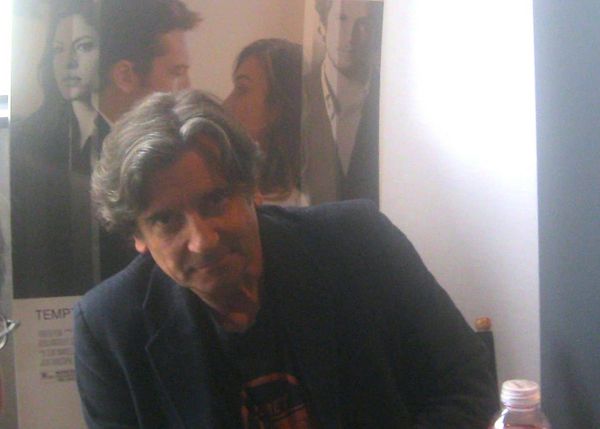 |
| Joan Didion: The Center Will Not Hold director Griffin Dunne Photo: Anne-Katrin Titze |
The Spotlight on Documentary programme at the 55th New York Film Festival has a number of high profile authors in the spotlight, including Gay Talese in Josh Koury and Myles Kane's Voyeur. Griffin Dunne's Joan Didion: The Center Will Not Hold with interviews with Harrison Ford, David Hare, Anna Wintour, Calvin Trillin, and Vanessa Redgrave (her Sea Sorrow is in the festival with Emma Thompson and Ralph Fiennes), and Rebecca Miller's portrait Arthur Miller: Writer (with Tony Kushner and Mike Nichols commenting on her father's career) are two excellent insider depictions. Aki Kaurismäki's The Other Side Of Hope (starring Sherwan Haji, Sakari Kuosmanen) and Chloé Zhao's The Rider, screening in the Main Slate, round out the four early bird highlights.
The Rider is the winner of the Grand Prix Award at the Deauville Festival of American Cinema and the Art Cinema Award in the Directors’ Fortnight of the Cannes Film Festival. The Other Side Of Hope has been selected as the FIPRESCI Grand Prix film of the year and the director received the award during the opening night of the San Sebastian Film Festival. Aki Kaurismäki took home the Silver Bear as Best Director at the Berlin International Film Festival.
Joan Didion: The Center Will Not Hold and Arthur Miller: Writer will have their world premieres next month at the New York Film Festival.
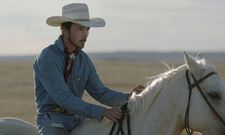 |
| The Rider |
The rider of the title is Brady (Brady Jandreau), a young rodeo champion, who, after an accident resulting in severe head injury, has to come to terms with the fact that his life will never be the same again. Entirely cast with nonprofessional actors, with many of them playing variations of themselves, The Rider gives a glimpse of life on the Pine Ridge Reservation in South Dakota. Brady, an actual horse trainer, is a revelation when he shows us what it entails to tame a horse. The craft, the knowledge, the deep communication with the animal, shown without words - this is breathtaking, transcendent cinema. Chloé Zhao, in her exquisite follow-up to Songs My Brothers Taught Me, captures the wonderful work. Brady puts out his fist towards the horse's head, tenderly, the way you do with a curious cat or dog stranger to signal, "Hey, I mean you well." "Let's go for a cruise - how does that sound, Bud?" Brady says to Apollo, the horse. And off they ride through the grasses, mountains in the vista. We feel the wind.
Public screenings: Thursday, October 12 at 9:15pm - Alice Tully Hall; Saturday, October 14 at 3:15pm - Alice Tully Hall - Expected to attend: Chloé Zhao for both screenings
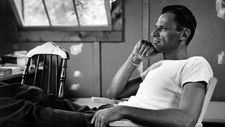 |
| Arthur Miller: Writer |
Arthur Miller: Writer
The film, bursting with love and wisdom, is divided into six chapters. Part I deals with Origins. Arthur Miller's older brother Kermit and younger sister Joan Copeland help sketch out the past. We learn that their immigrant father, "Izzie", was illiterate. After his arrival in New York, he went on the road as a salesman at age 16. Their mother, "Gussie", was the one with the artistic streak. Chapter II is dedicated to Broadway. An early failure almost bringing an end to his career. Tony Kushner talks about All My Sons. The goal of Miller's plays has always been "to make complicated things comprehensible." Chapter III, smartly titled Touching The Flame, deals both with the McCarthy witch hunt and his marriage to Marilyn Monroe. The House Un-American Activities Committee wreaked havoc in Hollywood and brought about his play The Crucible, set in 17th century Salem. The fourth chapter, Home, begins in the family kitchen with his wife Inge Morath while Arthur cuts up a roasted chicken. We get family background and find out why fathers are always mythological figures. The fifth chapter, Out Of Place, covers critics' reaction to Miller's late plays in the 70s and his work ethic. The final chapter, The Last Beginning, focuses on the revivals of Miller's works and the death of his wife of 35 years, whose passing "felt like that of a very young woman." Because "art is long and life is short," the film ends with the big mystery of creation. "My father was a national icon before I was born," Rebecca Miller says about Arthur Miller and his many different lifetimes.
Public screenings: Monday, October 9 at 6:30pm - Walter Reade Theater; Tuesday, October 10 at 8:30pm - Walter Reade Theater; Saturday, October 14 at 3:30pm - Walter Reade Theater - Expected to attend: Rebecca Miller
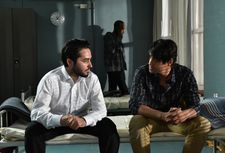 |
| The Other Side Of Hope |
A man changes his life because he has had enough of his marriage and his job as a shirts salesman. Another man emerges from the coal dust of a ship. His existance is of constant change, not out of choice, but because his home in Syria was bombed, most of his family killed and he is looking for his sister, whom he lost on the way from Greece to Serbia to Hungary to find a safe haven. The two men's stories merge in Aki Kaurismäki's latest, wondrous film. Nobody manages to combine distant genres, multi-colored moods, objects from past and present, sincerity and the absurd the way he does. In the police station where one of the heroes asks to seek asylum in Finland, the officer still uses a mechanical typewriter, while the latest fingerprint scanner shares the same desk. There are slapstick moments of hiding from fire inspectors behind a door while holding a puppy, Jean-Pierre Melvillian car rides, musical interludes, characters exiting a casino who resemble the two sisters in Nicolas Roeg's Don't Look Now, a trio of violent neo-Nazis, day-to-day business at the Finnish immigration office, and a wild, short-lived transformation of a restaurant into a sushi place that includes salted herring served with lumps of wasabi that would last a lifetime. Kaurismäki proves again that it is possible to make a film that is uproarious and still sheds light on a very serious crisis.
Public screenings: Thursday, October 5 at 9:30pm - Alice Tully Hall; Tuesday, October 10 at 8:30pm - Howard Gilman Theater - Expected to attend: TBD
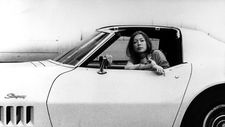 |
| Joan Didion: The Center Will Not Hold |
Joan Didion: The Center Will Not Hold
"Remember what it is to be me - that is always the point," says Joan Didion in Griffin Dunne's deeply affecting portrait of his aunt. It is always wonderful when a film about a writer you admire produces sentences - be it in dialogue, commentary or excerpts that you overlooked from the published texts - that are so poignant in the now and feel brand new. Raoul Peck did this with James Baldwin in I Am Not Your Negro and Joan Didion: The Center Will Not Hold does it too. Dunne starts out with a conversation about "coming to terms with disorder" and "when snakes would appear so much". Didion asks her nephew if he has any snakes and he responds that, no, he kills them. "Killing a snake is the same as having a snake," is Didion's stunning reply. Let's take the snakes. Or rather, let's not take them. Another remarkable film in this festival delivers the absolutely perfect visual companion piece, snake-wise. Joachim Trier's Thelma, a film about disorder in manifold ways, offers the Scandinavian relatives of the Didion snakes that haunted me for years. From time to time, when relevant, they come back when "food would seem to arrange itself into ominous coils."
Public screenings: Wednesday, October 11 at 6:00pm - Alice Tully Hall; Thursday, October 12 at 9:00pm - Francesca Beale Theater; Saturday, October 14 at 1:00pm - Walter Reade Theater - Expected to attend: Griffin Dunne on October 11 and October 12
The 2017 New York Film Festival runs from September 28 through October 15.





















